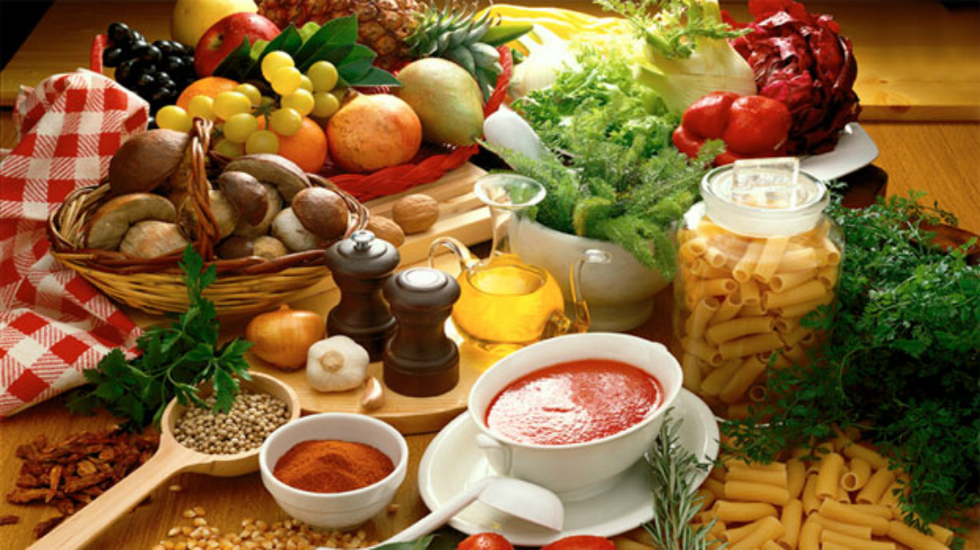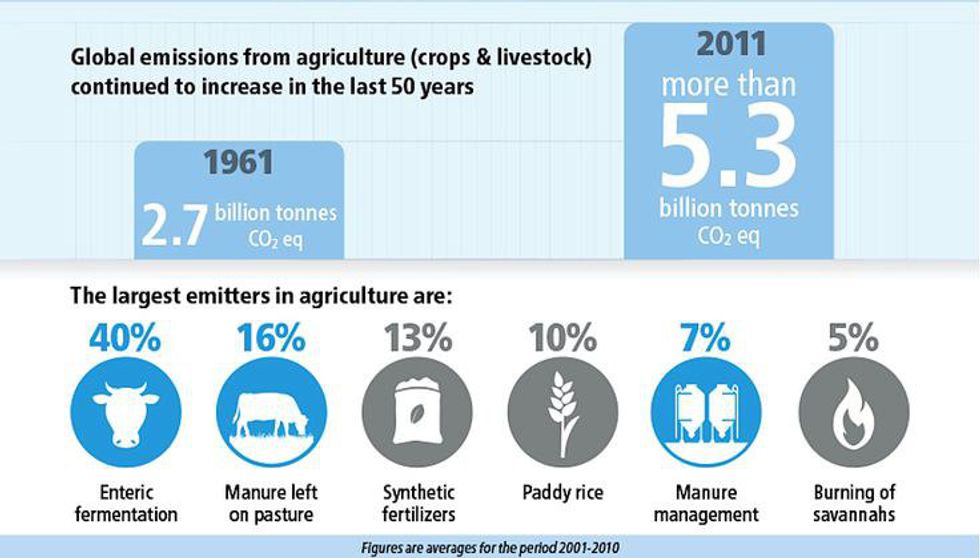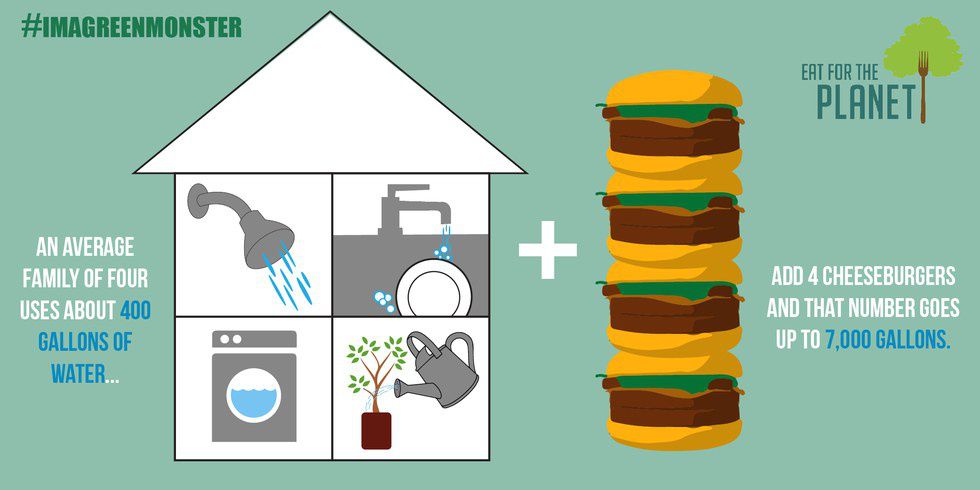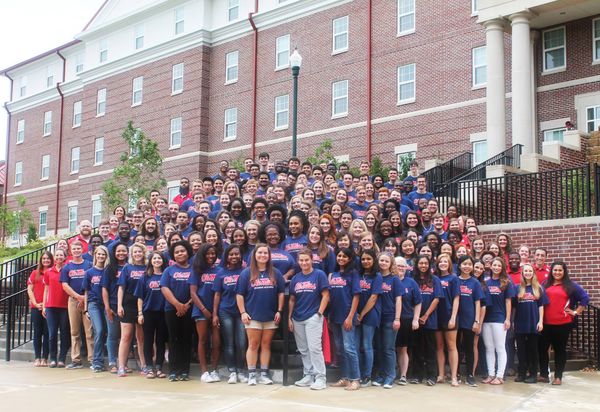It’s been scientifically proven that a plant-based whole food diet is vastly healthier for our bodies, will have a supremely positive effect on the environment, sustain and flourish our planet, as well as simply increase the amount of food available and produced around the world. Why then is everyone so hesitant to accept it? Why is veganism still seen as a “fad”?
Inaccessibility.
Recommended for you
Inaccessibility because of the meat and dairy industry that have not only fed us lies, but make up a massive part of our market and so anything else, any healthy, plant based organic food you find in the store, is simply more expensive. They create they need and demand for their own products by ingraining the notion that we need and should demand it in our culture. I grew up, as did most people and definitely most Americans, thinking that you need meat. Without it, I thought, you can’t get enough protein. You’ll have to live on vitamins and supplements. That’s simply not the case. However, the purely positive impact a plant-based diet will have on us, our bodies, and our planet, is being shoved aside because people are of the mindset that this huge machine that is animal agriculture will never change and the industry does everything in it’s power to make that so. However, we’re all running out of time. We can’t shove this aside anymore. Our planet is dying. Our environment is collapsing as we fall further and further into Global Warming. Our carbon footprint is simply astounding. Species are dying out. Deforestation is at an ever increasing rate. Our oceans are being destroyed. Our water supplies face contamination and overuse. Our people are facing diseases that can be treated, aided, or, in some cases, prevented. I don’t mean to scare you, but it’s okay to be scared. It is scary. However, we can face it and change it.
Our culture thrives on phases of the next diet fad and “health” plan because it’s obsessed with weight loss. Models on magazines are the images we’re told to strive for and you will struggle to find a woman’s magazine that doesn’t feature a weight loss headline on the cover. A plant-based diet will certainly regulate your weight, but it isn’t about the numbers on the scale that this world wants you to believe it is. Stop counting calories and start counting ingredients. On a plant-based diet, our bodies naturally revert back to their natural weight. Thus, already we are at contention with the ideals our society tells us we should uphold. Instead of pushing one image of health, a plant-based diet promotes severalIt promotes the individuality within all of our bodies while also celebrating the health benefits. My natural body weight might not be the same as the person’s next to me, but both are healthy if our bodies are telling us while eating whole plant foods that this is the way we should be and it’s regulating it. No more jumping on a scale every day. No more comparing yourself to everyone around you. Instead, take note of how you feel. You’ll feel stronger, lighter, and more energized. The plant-based diet promotes a happy image of healthy rather than an image of deprivation and it’s the production market that refuses to recognize it because you can’t benefit from people no longer having a need. When you deprive, you always need. When you provide, you are content.
America is also one of the sickest societies. We have a surplus of what are mostly considered “lifestyle” illnesses and our societies answer to treat most of them is simply medicine. I’m certainly not advocating for cutting all drugs and medication out of our lives. Science has made steps and advances in treating a great deal and that should be celebrated and embraced. However, there are other cases where we can treat ourselves. We can take control. At the very least, we can help our bodies get into the best shape possible and be the strongest bodies possible to make our immune system the best sidekick to help the medication fight off illness. It’s been scientifically proven and exemplified that a whole foods plant-based diet will not only strengthen our immune system to help fight off disease and illness (just look at the case of Ella Woodward, otherwise known as Deliciously Ella), but can also be preventative combatants of heart disease, high cholesterol, diabetes, and obesity. At the end of the day, it’s costing us more. Remember those blood sugar, blood pressure, and cholesterol numbers that sent your health insurance rates through the roof? Case after case has shown a dramatic increase and improvement across the board for people who were in the danger zone in many of those categories and had adopted the plant-based diet saw the incredible change almost instantaneously.
It’s not just aiding our insides, but our outsides as well. We’re not made to consume dairy. Cow’s milk is produced for the baby cow. The thought that we even drink and consume the milk from another animal is singular only to humanity in the animal kingdom. “The purpose of cow’s milk is to turn a 65-pound calf into a 700-pound cow as rapidly as possible. Cow’s milk IS baby calf growth fluid,” Dr. Michael Klaper explains. The hormones, lipids, and proteins inside of that milk are responsible for some of the irregularities and issues that arise in us from growth from early on-set puberty, skin blemishes and acne, hair, and yes, even our bones. Milk does not, in fact, make our bones stronger as we’ve been told all of our lives, but actually quite the opposite. Populations without so much access to dairy and animal populations who do not consume dairy all have been reported to have stronger bones. With that, of course, we’ve got the many companies that profit off of all of those expensive skin-care treatments that never seem to fully work and the biggest benefactor of all; the dairy industry. If their number one and constantly stated argument of support for their product, that it strengthens our bones and provides us with the top notch calcium we need, proves not to be true, then what do we need them for? Thus, the pushback there.
The constant denial that plants can provide the necessary calcium we need, and better than dairy, is rebuked and the thought that simply eating plant-based whole foods can even improve our beauty regiments and skin care is shut down because of the margin loss those companies that profit would take. Thus they sell us on these products before we even need them. We are told they are necessities in life before we even understand how our bodies work. Plant-based food rejuvenates, revives, and replenishes you from the inside out. Why is that still a surprise to so many? Why does the culture still shout and scream whenever the thought of eating something other than animal products and by-products comes up in discussion? Why is it so hard to understand that it’s not just healthy, but healthier to sustain yourself on plant sourced protein and vitamins? It’s because society has already been taught the opposite and it’s harder to unlearn than it is to learn.
There is also the clear and ever progressing factor of our environment. How anyone can call themselves an environmentalist and still consume animal products and dairy products, supporting the animal agriculture industry, after learning about the negative effects on our planet is, frankly baffling. Our carbon footprint can be cut by more than 50% by switching over to a plant-based diet; much more than even the basics of carpooling, short showers, turning the water off when you brush your teeth, and bicycling to work instead of driving can do. With more than half the water consumed in the country is used to continue and run the animal agriculture business, there’s a problem. An entire one third of the whole world’s water is being used for the industry; a ratio that is one hundred percent unsustainable and prodigal. The green-house gas emission that is expelled from animal agriculture is also astoundingly high.
The industry is responsible for more greenhouse gas emission than the entire transportation system, at a staggering 18%. These numbers are undeniable. We can also produce more food by using more land more wisely. The amount of land it takes to sustain animal agriculture is almost half of the planet. The ratio is about 1000:1 pounds for the amount of plant food that can be produced versus animal products for the same amount of land. When world hunger, homelessness, poverty, and sickness within all of that is still so prevalent in our world, the notion that we can feed better and more food to more of the world that is so in desperate need of it, if we wanted to, makes you not only question how anyone could doubt these numbers, but how we, as an advanced society, would not strive towards this conservation and provision. However, with clear imagery of the impact global warming has on our society from the ever lowering number of biodiversity, the increased pollution, the depletion and destruction of the marine life in our oceans, and ever progressing deforestation, scientists and society will only push one thing. They will only, and not even all, recognize that part of their comfort and behavior can be causing this and it’s a lot easier to point fingers at machines rather than people.
There’s also the humanitarian portion of the plant-based lifestyle, beyond environmentalism. When we are specifically birthing, raising, and rearing animals solely to slaughter them after a few months of life, one must question the morality there. There is actually promising scientific research and progress in the works right now for meat that is grown in a lab, which would not only cut back on most of the negatives listed above, and could be free of some of the dangerous bacteria that can be found in our meat products. No animals will be harmed and presumably the carbon footprint left but he meat industry could be cut down. However, with every promising development and future, all we can do is wait and see on that front. Until then, however, there is still the facts at hand. A plant-based whole foods diet is better for us and the world we live in, yet the industries that thrive off of it’s downfall and thus, our downfall, not only continually deny and report against the scientific proof illustrated time and again, but because of their monopoly on the industry and out culture, make it impossible for everyone everywhere to even have access to the healthy foods necessary to allow them to experience the benefits of a plant-based diet.
Our environment and our people can’t change if we can’t all change, and we can’t all change if some of us can’t afford to or don’t have the access or understanding to. Not only are most of our doctors not educated in nutrition and thus most of the world remains blind to the fact that nutrition is medicinal, but there are so many parts of America alone that are fighting right now to get by and to eat; they’re struggling to just gain access to online shops to use their food-stamps to simply obtain any sort of healthy and plant-based items rather than the cheap and unhealthy alternatives that are more readily available ; and who profits from that? The dairy and meat industries. In a lot of countries, buying and actual good piece of meat is not so affordable. Common sense would say plant-based food that take less effort, resources, and money would be more affordable. However, common sense isn’t running the industry. The dairy and meat industries are dictating our food culture and taking away our control.
Thus, while the diary and meat industries continue to tell us that we need them, continue to press into our minds from an early age that meat and dairy are good, taste good, and the alternative is bad, and continue to sacrifice our lives and our planet, we can make that change. We can educate, we can spread the word, and we can take the extra steps necessary to slow the demand. Those who can afford to can change the way the industry runs. We can take the reins back. We can make it affordable for those it not (and that’s a great many). Our health should should be a right, not a privilege. We can’t continue to sustain ourselves on the diet and culture we are currently residing within. Our planet will run out of time. Our bodies will run out of time. Let’s not wait any longer. Al Gore was correct when he said it was “an inconvenient truth”, but let’s make it convenient for the next generations. Let’s not lay waste to a planet and a population before they are even born into it. Let’s save ourselves.
If you want to think a bit more about all of this, two good educational documentaries currently on Netflix speak to these issues; Cowspiracy (2014) and PlantPure Nation (2015).

























